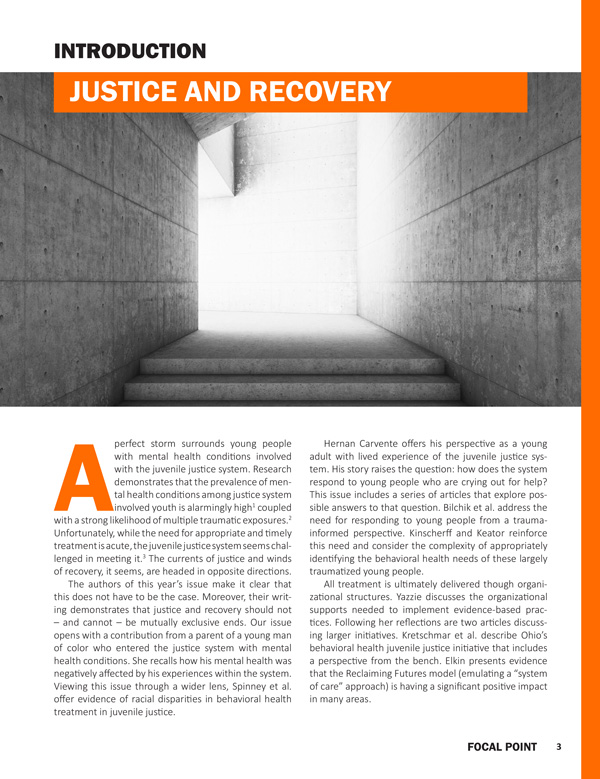
Abstract: This introduction from Focal Point editor John Ossowski discusses how this issue addresses the current state of juvenile justice and where research indicates the future is headed.
"Introduction: Justice and Recovery" (2017)
By John Ossowski
A perfect storm surrounds young people with mental health conditions involved with the juvenile justice system. Research demonstrates that the prevalence of mental health conditions among justice system involved youth is alarmingly high1 coupled with a strong likelihood of multiple traumatic exposures.2 Unfortunately, while the need for appropriate and timely treatment is acute, the juvenile justice system seems challenged in meeting it.3 The currents of justice and winds of recovery, it seems, are headed in opposite directions.
The authors of this year's issue make it clear that this does not have to be the case. Moreover, their writing demonstrates that justice and recovery should not – and cannot – be mutually exclusive ends. Our issue opens with a contribution from a parent of a young man of color who entered the justice system with mental health conditions. She recalls how his mental health was negatively affected by his experiences within the system. Viewing this issue through a wider lens, Spinney et al. offer evidence of racial disparities in behavioral health treatment in juvenile justice.
Hernan Carvente offers his perspective as a young adult with lived experience of the juvenile justice system. His story raises the question: how does the system respond to young people who are crying out for help? This issue includes a series of articles that explore possible answers to that question. Bilchik et al. address the need for responding to young people from a trauma-informed perspective. Kinscherff and Keator reinforce this need and consider the complexity of appropriately identifying the behavioral health needs of these largely traumatized young people.
All treatment is ultimately delivered though organizational structures. Yazzie discusses the organizational supports needed to implement evidence-based practices. Following her reflections are two articles discussing larger initiatives. Kretschmar et al. describe Ohio's behavioral health juvenile justice initiative that includes a perspective from the bench. Elkin presents evidence that the Reclaiming Futures model (emulating a "system of care" approach) is having a significant positive impact in many areas.
This issue closes by considering the future in light of new research. An interview with Davis and Sheidow examines an emerging-adult enhancement to multi-systemic therapy that holds the promise of reducing recidivism. Mulvey et al. describe initial findings from the longitudinal Pathways to Desistence study. Their analyses consider how having a mental health condition may – or may not – effect a successful transition to adulthood.
I hope the reader finds within the following pages a breadth and depth of knowledge that will dissipate the clouds of the "perfect storm" and set a common course for justice and recovery – for all young people.
Editorial note: The editors wish to extend a special thanks to William Feyerherm and Myrth Ogilvie for their assistance.
References
- Shufelt, J.L., & Cocozza, J.J. (2006). Youth with mental health disorders in the juvenile justice system: Results from a multi-state prevalence study. National Center for Mental Health and Juvenile Justice Research and Program Brief. Retrieved from https://www.unicef.org/tdad/usmentalhealthprevalence06(3).pdf
- See, for instance: Ford, J., Chapman, J., Connor, D., & Cruise, K. (2012). Complex trauma and aggression in secure juvenile justice settings. Criminal Justice and Behavior, 39(6), 694–724.
- Zajac, K., Sheidow, A., & Davis, M. (2015). Juvenile justice, mental health, and the transition to adulthood: A review of service system involvement and unmet needs in the U.S. Children and Youth Services Review, 56, 139–148.
Suggested Citation
Ossowski, J. D. (2017). Introduction: Justice and Recovery. Focal Point: Youth, Young Adults, and Mental Health, 31, 3-4. Portland, OR: Research and Training Center for Pathways to Positive Futures, Portland State University.